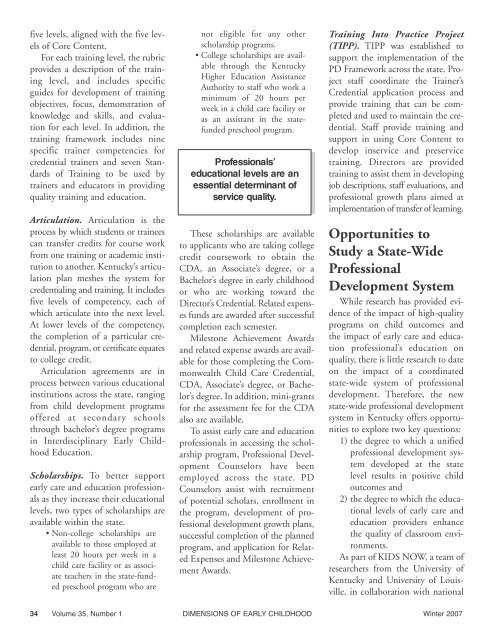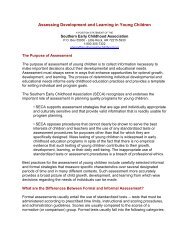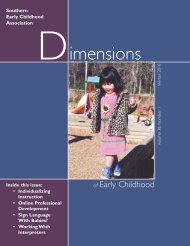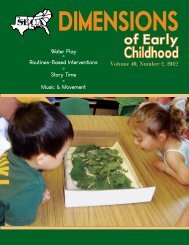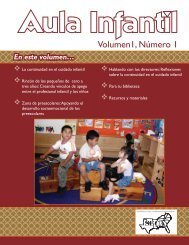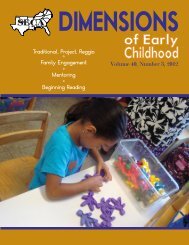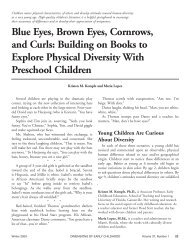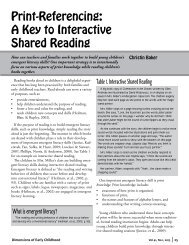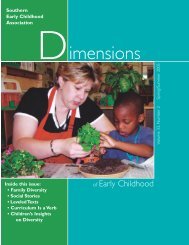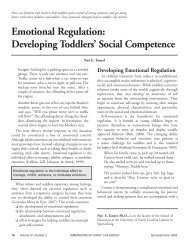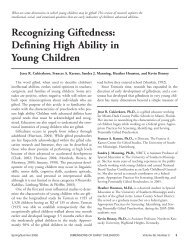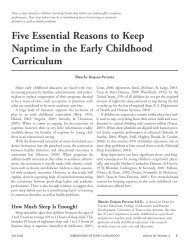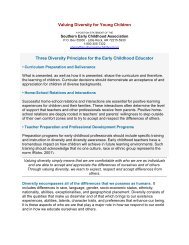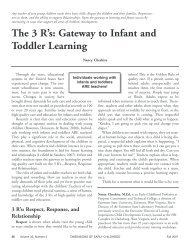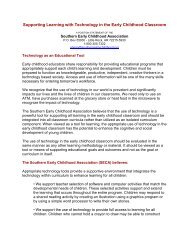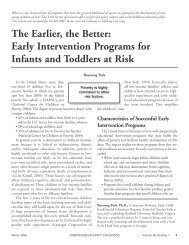Dimensions of Early Childhood - Southern Early Childhood ...
Dimensions of Early Childhood - Southern Early Childhood ...
Dimensions of Early Childhood - Southern Early Childhood ...
Create successful ePaper yourself
Turn your PDF publications into a flip-book with our unique Google optimized e-Paper software.
five levels, aligned with the five levels<br />
<strong>of</strong> Core Content.<br />
For each training level, the rubric<br />
provides a description <strong>of</strong> the training<br />
level, and includes specific<br />
guides for development <strong>of</strong> training<br />
objectives, focus, demonstration <strong>of</strong><br />
knowledge and skills, and evaluation<br />
for each level. In addition, the<br />
training framework includes nine<br />
specific trainer competencies for<br />
credential trainers and seven Standards<br />
<strong>of</strong> Training to be used by<br />
trainers and educators in providing<br />
quality training and education.<br />
Articulation. Articulation is the<br />
process by which students or trainees<br />
can transfer credits for course work<br />
from one training or academic institution<br />
to another. Kentucky’s articulation<br />
plan meshes the system for<br />
credentialing and training. It includes<br />
five levels <strong>of</strong> competency, each <strong>of</strong><br />
which articulate into the next level.<br />
At lower levels <strong>of</strong> the competency,<br />
the completion <strong>of</strong> a particular credential,<br />
program, or certificate equates<br />
to college credit.<br />
Articulation agreements are in<br />
process between various educational<br />
institutions across the state, ranging<br />
from child development programs<br />
<strong>of</strong>fered at secondary schools<br />
through bachelor’s degree programs<br />
in Interdisciplinary <strong>Early</strong> <strong>Childhood</strong><br />
Education.<br />
Scholarships. To better support<br />
early care and education pr<strong>of</strong>essionals<br />
as they increase their educational<br />
levels, two types <strong>of</strong> scholarships are<br />
available within the state.<br />
• Non-college scholarships are<br />
available to those employed at<br />
least 20 hours per week in a<br />
child care facility or as associate<br />
teachers in the state-funded<br />
preschool program who are<br />
not eligible for any other<br />
scholarship programs.<br />
• College scholarships are available<br />
through the Kentucky<br />
Higher Education Assistance<br />
Authority to staff who work a<br />
minimum <strong>of</strong> 20 hours per<br />
week in a child care facility or<br />
as an assistant in the statefunded<br />
preschool program.<br />
Pr<strong>of</strong>essionals’<br />
educational levels are an<br />
essential determinant <strong>of</strong><br />
service quality.<br />
These scholarships are available<br />
to applicants who are taking college<br />
credit coursework to obtain the<br />
CDA, an Associate’s degree, or a<br />
Bachelor’s degree in early childhood<br />
or who are working toward the<br />
Director’s Credential. Related expenses<br />
funds are awarded after successful<br />
completion each semester.<br />
Milestone Achievement Awards<br />
and related expense awards are available<br />
for those completing the Commonwealth<br />
Child Care Credential,<br />
CDA, Associate’s degree, or Bachelor’s<br />
degree. In addition, mini-grants<br />
for the assessment fee for the CDA<br />
also are available.<br />
To assist early care and education<br />
pr<strong>of</strong>essionals in accessing the scholarship<br />
program, Pr<strong>of</strong>essional Development<br />
Counselors have been<br />
employed across the state. PD<br />
Counselors assist with recruitment<br />
<strong>of</strong> potential scholars, enrollment in<br />
the program, development <strong>of</strong> pr<strong>of</strong>essional<br />
development growth plans,<br />
successful completion <strong>of</strong> the planned<br />
program, and application for Related<br />
Expenses and Milestone Achievement<br />
Awards.<br />
Training Into Practice Project<br />
(TIPP). TIPP was established to<br />
support the implementation <strong>of</strong> the<br />
PD Framework across the state. Project<br />
staff coordinate the Trainer’s<br />
Credential application process and<br />
provide training that can be completed<br />
and used to maintain the credential.<br />
Staff provide training and<br />
support in using Core Content to<br />
develop inservice and preservice<br />
training. Directors are provided<br />
training to assist them in developing<br />
job descriptions, staff evaluations, and<br />
pr<strong>of</strong>essional growth plans aimed at<br />
implementation <strong>of</strong> transfer <strong>of</strong> learning.<br />
Opportunities to<br />
Study a State-Wide<br />
Pr<strong>of</strong>essional<br />
Development System<br />
While research has provided evidence<br />
<strong>of</strong> the impact <strong>of</strong> high-quality<br />
programs on child outcomes and<br />
the impact <strong>of</strong> early care and education<br />
pr<strong>of</strong>essional’s education on<br />
quality, there is little research to date<br />
on the impact <strong>of</strong> a coordinated<br />
state-wide system <strong>of</strong> pr<strong>of</strong>essional<br />
development. Therefore, the new<br />
state-wide pr<strong>of</strong>essional development<br />
system in Kentucky <strong>of</strong>fers opportunities<br />
to explore two key questions:<br />
1) the degree to which a unified<br />
pr<strong>of</strong>essional development system<br />
developed at the state<br />
level results in positive child<br />
outcomes and<br />
2) the degree to which the educational<br />
levels <strong>of</strong> early care and<br />
education providers enhance<br />
the quality <strong>of</strong> classroom environments.<br />
As part <strong>of</strong> KIDS NOW, a team <strong>of</strong><br />
researchers from the University <strong>of</strong><br />
Kentucky and University <strong>of</strong> Louis -<br />
ville, in collaboration with national<br />
34 Volume 35, Number 1 DIMENSIONS OF EARLY CHILDHOOD Winter 2007


